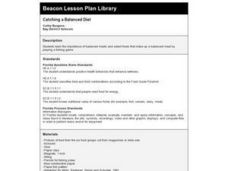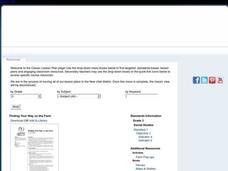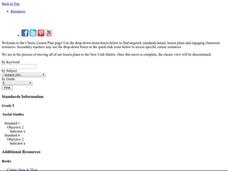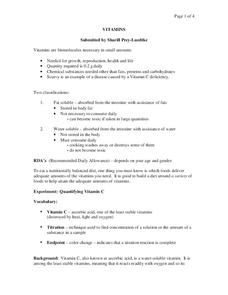Curated OER
Creeping and Crawling Observing Mealworms and Earthworms
Students observe the inherited traits in earthworms and mealworms. In this organisms activity, students view a live mealworm and earthworm on a tray and identify the body parts. Students measure the worms and observe the behavior....
Beacon Learning Center
Catching a Balanced Diet
First graders explore the importance of balanced meals. They play a fishing game to help them select foods to make up a balanced meal.
Curated OER
A Day Without Agriculture
Second graders define and create a list of agricultural products. In this producers and consumers lesson, 2nd graders participate in a contest to find as many types of agriculture as they can. The student who comes up with the best...
Curated OER
Agriculture Pays
Second graders role play one of the jobs related to agriculture and explain their role in getting one of the five "f's" of agriculture to the consumer. In this agriculture lesson, 2nd graders are assigned a role and a commodity. Each...
Curated OER
Cows, Worms and Compost
Third graders explore agriculture by viewing a PowerPoint presentation in class. For this animal relationship lesson, 3rd graders identify the types of farm animals humans feed on and their dependency on such small insects like worms....
Curated OER
Corn: An A--Maizing Plant
Third graders examine the history of corn. In this agriculture lesson, 3rd graders discuss the history of corn and identify the corn belt on a map. Students dissect kernels of corn and discuss their observations.
Curated OER
Finding Your Way On the Farm
Third graders explore the food industry by viewing a presentation about farming. In this farming geography lesson, 3rd graders view globes and maps while identifying the prime geographical locations for fertile land. Students view a...
Curated OER
Loco for Cocoa
Third graders research the history of cocoa. In this cocoa lesson, 3rd graders investigate how the cocoa bean has been traded from one country to another. Students create a timeline and map to track the history of the cocoa bean.
Curated OER
How Much is Dirt Worth?
Fourth graders graph the percentages of the materials that make up the Earth and complete computations based on their results. In this topsoil lesson, 4th graders diagram the different layers of Earth's composition.
Curated OER
Rain On
Fourth graders explore evaporation and condensation. In this water cycle lesson, 4th graders investigate their surroundings for real-life examples of evaporation and condensation. Students conduct various experiments.
Curated OER
Soil in My Food Web
Fourth graders understand the importance of soil to the food web. In this food web lesson, 4th graders create various food webs beginning with soil using yarn and name cards. Students write about the importance of soil to one organism.
Curated OER
What's in the Soil?
Fourth graders examine soil to find its contents, and how much water and air they can measure. In this soil composition instructional activity, 4th graders perform three experiments and record their results. In one experiment they...
Curated OER
Farm to Lunch: Exploring Agricultural Careers
Fourth graders examine Utah's economic structure and learn about agricultural careers. In this agricultural careers lesson, 4th graders follow agricultural products from their source to the lunch table. Students chart their results to...
Curated OER
Caring for the Land
Fifth graders examine how to care for the land. In this soil management lesson, 5th graders participate in a service learning project and assist in the preservation of natural resources.
Curated OER
Paint's Family Tree
Students sort and classify the genetic traits of horses. In this heredity and genetics lesson, students read dialogue in a skit in which specific physical traits of several horses are described and a horse family tree is created....
Curated OER
Bison on the Plains
Fifth graders explore U.S. geography by reading assigned text about American Indians. For this migration lesson, 5th graders identify the differences between Native Americans and European settlers who traveled through middle America in...
Curated OER
King Cotton
Fifth graders explore the cotton plant. In this cotton lesson, 5th graders research the process of growing cotton. Students explore the economic and cultural differences in the states that grew cotton for trade and industry.
Curated OER
Now You Have It, Now You Don't
Sixth graders compare corn-based shipping peanuts to Styrofoam shipping peanuts. In this hands-on environmental awareness lesson, 6th graders try dissolving two different types of packing peanuts in water.
Curated OER
Microbe Experimentation
Sixth graders conduct a microbe experiment. In this microbe lesson plan, 6th graders develop an experiment with micro-organisms, complete the associated worksheet, and complete a table showing the results.
Curated OER
From Foraging to Farming
Students experience the difficulty that goes along with foraging for food. In this activity on the importance of modern agriculture, students simulate how there simply is not enough food and water for everyone when agricultural means are...
Curated OER
Philanthropy, Volunteering And Service: the Historical Connections Lesson 2: Hunger Hurts
Students investigate the effects of hunger on a personal and community level. They examine how philanthropy can help alleviate hunger issues in the world and in their own community. They look at the available services using Internet...
Curated OER
Quick Breads, Muffin Method Demo
Students learn what quick breads are and that they belong to the Bread, Cereal, Grain Food Group on the Food Guide Pyramid which are high in Carbohydrates. They identify characteristics to look for in quick bread products, the...
Curated OER
Vitamins
Students determine the amount of vitamin C present in 3 samples of juice stored in various light conditions. In this vitamin lesson plan, students investigate the amount of vitamin C present in juice exposed to different quantities of...
Curated OER
An Inside Look at Apples
First graders examine and identify parts of an apple. In this biology lesson, 1st graders cut an apple in half and locate all the parts, use the apple halves as stamps, and create a bar graph displaying which apple types the students...

























